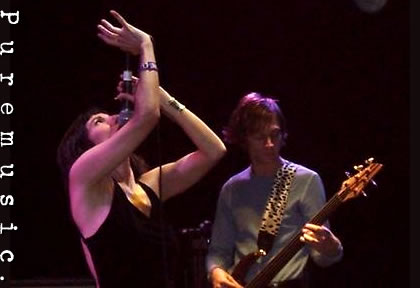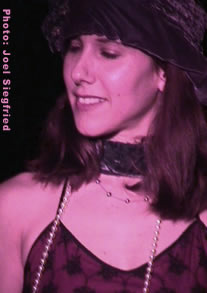
A Conversation
with Joy Eden Harrison (continued)
JEH: I love being on stage. To me, that's everything. That is the moment when the music and all the writing--maybe that's what Joe Diorio was saying for me, as an artist as a whole, that's the place where you forget everything and life lives through you.
PM: Mmm.
JEH: Because you have to be present in the moment on stage. And to me, sound is also very visual. It sort of goes with movement, and the way you cut through space. In the same way that sound cuts through space, bodies cut through space, instruments cut through space. I just see that aspect of the art growing over the course of my life. I see that aspect integrating with all the senses, all the senses, but in the moment where you can forget everything.
PM: I remember one time seeing you in a hotel room at a Folk Alliance. And there was a group of people in the room getting ready to see you play your songs. And you turned your back to the audience in a very dramatic way, and when you turned to them again, it felt like, "Wow, someone new had arrived."
[laughter]
PM: And I remember thinking, "Oh, my. Look at that." It was amazing. It was just pure presence, is what it was, which is something that's so--when presence shows up, it's mind blowing.
JEH: Wow. I think that was also a pretty calm show, so I'm glad that it all came through. I think, too, that artists on screen--I mean, when you're on stage, you become a screen, and everybody in the audience, it feels like--I don't know how to say this right--they need you to be there for them, because they need to put themselves--it's sort of like the reader and a book can't be separated. And the reader brings everything of who they are to what they're reading. And I feel that way on the stage as an artist. I need to be pure to the art, and yet wide open to be a screen for everybody to put on me what they need as a viewer. Does that make sense? Maybe not.
PM: It makes the kind of sense I'm looking for, I'll tell you that.
[laughter]
PM: I can only speak for myself. Do you consider yourself to be a spiritual person?
JEH: Oh, that's tricky territory. Yeah, I suppose I do. Definitely not a religious person, but a spiritual person.
PM: Yeah.
JEH: I feel--I guess every religion has something in it at its core that's quite profound.
PM: Yeah, if it can be found.
[laughter]
PM: Are you oriented in any particular way or ways, spiritually?
JEH: I wouldn't say that. I feel pretty wide open. I'm oriented toward, if I would say that, the mystical aspect of all religions.
PM: Do you read much in your life?
JEH: Intermittently, I read--I mean, actually, I read quite a bit. But lately a lot of my reading has been in service of teaching. So there has been a lot of non-fiction about the practice of teaching.
PM: That very interesting.
JEH: But as far as writers, I love Toni Morrison's books. And right now I just picked up The God of Small Things. I've just read the first two pages. But I think as soon as I have another break I want to finish that book.
PM: Are you listening to anything fun lately?
JEH: Listening to anything fun lately... Not as much as I would like to be, I'll say that. I'm always and forever listening to Chet Baker.
PM: Ah.
JEH: So he's kind of a soundtrack to my life, always and ever.
PM: Interesting. Like my friend Kami Lyle, she's always listening to Chet Baker, or so I have gathered.
JEH: Ah.
PM: And she's another great jazzy singer/songwriter.
JEH: Wow. He's so beautiful because his statements are simple, yet very, very deep.
PM: Mmm. And what are your plans, your aspirations? What would you like to see happen?
JEH: Happen with this album, or happen in the next ten years or--
PM: Whatever you'd like to say about any of that.
JEH: Oh, I suppose I would like to find--which is just starting to happen as teaching is becoming more comfortable after a few years--a balanced life. A life where I put out an album every maybe three years, and tour during the summer, and not take the money part of music seriously at all, but to ride just straight into the creation and the performing.
PM: That's a very interesting paradigm. And I think we may see more people adopting that view of music and creativity. I think that's a fascinating approach. And I wish you the best of luck with it.
JEH: Well, thank you.
![]()
[Thanks to photographers Andrew Steiner (check out more of his fine work here) and Joel Siegfried. Joel's series of live Joy photos is here, and you can find out about his Dark-Thirty house concert series here.]
 |
|
| print (pdf) | |
| listen to clips | |
| visit Joy's site | |
| buy Blue Venus here | |
| buy Unspoken here | |
| buy Angel Town here | |
| puremusic home | |